Politics
GOV OTTI SAYS ABIA WILL LEVERAGE DIGITAL TECHNOLOGY TO GROW ECONOMY
Published
11 months agoon
By
Ekwutos Blog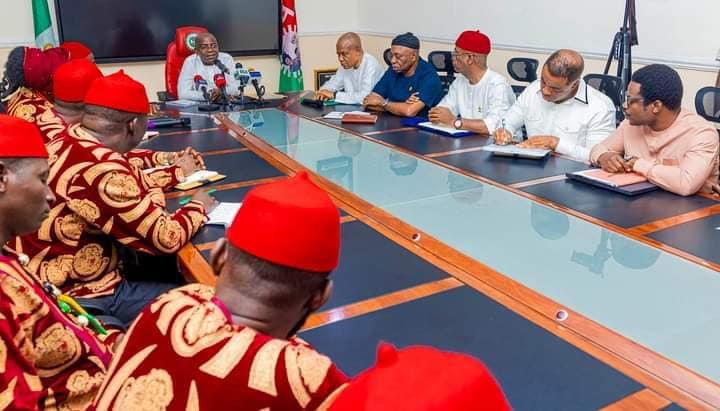
Abia State Governor, Dr. Alex Otti, OFR, says his administration is passionate about taking advantage of the opportunities provided by digital technology in managing the state’s economy.
Governor Otti stated this on Monday while addressing participants of Study Group 7, Senior Executive Course 46 of the National Institute for Policy and Strategic Studies, Kuru Jos, who are on study tour and fact-finding mission to Abia state.
The Governor, who commended the participants for the choice of Abia for the tour, described the study theme: ‘Digital Economy,Youth Empowerment and Sustainable Job Creation in Nigeria: Issues, Challenges and Opportunities’, as key, noting that any organisation that fails to key into the digital space will be left behind.
“In a few days, we will be one year in office, so the things we have in stock, we’re just unfolding them. Somehow, I feel we’re at the dress rehearsal stages. We’re still at building stage in terms of digital economy, I can assure you that by the time you come back to the State in about one or two years, you will see that all the work we’re doing behind the scene would have been rolled out and our people will begin to leverage on digital technology to push the economy,” he said.
According to the Governor, the State Government is making concerted effort to make its workforce adjust to the trends in the digital age.
“We are preparing our workforce to embrace digital economy. I can tell you that our workforce is geared towards digital economy and all the opportunities that it presents,” the Governor told his visitors.
Governor Otti said that the Government was working to establish an innovation hub, digital hub, and the Abia Innovation and Industrial Park, saying that Abia has keyed into the 3 Million Technical Talent (3TTM) agenda of the Federal Government.
He noted that the world now dwells more on artificial intelligence, robotics, electric vehicles, driverless cars among other technologies, adding that the study theme aligns with his initiatives as he had upon assumption of office created the Ministry of Digital Economy and SMEs.
“There are a lot of businesses that I look at today and in my own little understanding, I can see that these businesses are threatened. We are now in the world of artificial intelligence, the world of robotics, electric vehicles, driverless cars, and those technologies generally. You will just find out that those old ways of doing things will soon give way.
“I believe that this study tour will expose you to a whole lot of new things and I want to thank you once again for the choice of Abia. Relax and enjoy the hospitality of this state. We take the issue of security serious here, entertain no fear. We do not tolerate crime and criminality and we have also demonstrated that if you commit any crime here, we will get you within 36 hours using a combination of sophisticated technology and intelligence,” Governor Otti stated.
In his remarks earlier, the team lead, Brigadier General L. A. Jimoh, said the National Institute for Policy and Strategic Studies (NIPSS) was established by the administration of General Olusegun Obasanjo in 1979, as a high-level institution and foremost think tank to provide and proffer solutions to burning issues for the overall well-being and progress of the country.
He noted that the Institute had the mandate to develop a crop of top-class leaders of intellectual capacity, annually, to attend to the challenges across all strata of development.
“Every year, Mr. President tasks NIPSS to conduct research on a topical issue and submit Report to Government later in the year in a forum called, ‘The Presidential Parley’. This year’s theme for the SEC 46, 2024 is: ‘Digital Economy, Youth Empowerment and sustainable Job Creation in Nigeria: Issues, Challenges and Opportunities.
“Abia State is considered critical to our theme this year and also because of its contributions to the economic agenda of the country. Your State is known for its rich arts and culture, vast human resources, technology, industry and unmatched records for talents in almost all areas of life. All these have direct relationship with digital economy, youth empowerment and sustainable job creation which is our theme”.Brig. General Jimoh explained.
He described Abia as crucial to the realisation of the objective of the group which is a good Presidential Parley Report as Abia is involved in massive investment in human capital development, investment in electricity, a critical requirement for a digital economy, massive infrastructural development as well as the health sector.
The visit provided the participants the opportunity to interact with Governor Otti and asked him questions on various issues pertaining to his experience in office in the last 11 months.
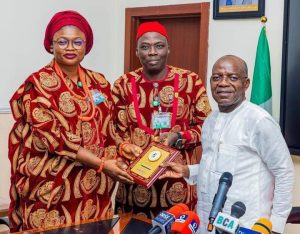

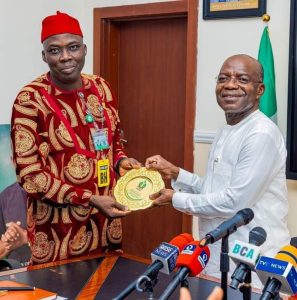
KAZIE UKO
Chief Press Secretary to the Governor
Abia State
Government House, Umuahia
May 14, 2024
You may like


NAF airlifts Airforce students to their destinations across Nigeria


APC CANDIDATES FOR 2025 NIGER STATE LOCAL GOVERNMENT COUNCIL ELECTION
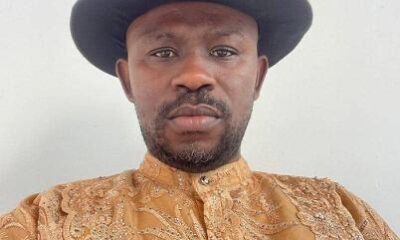

Kyari brought structure, stability to NNPCL – NDYC
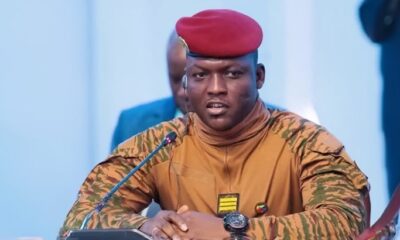

ANALYSIS: With Traore, Burkina Faso can get governance right, achieve developmental aspirations
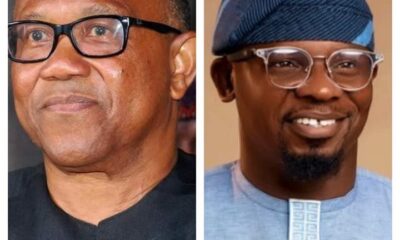

PETER OBI WILL WIN 2027 ELECTION EFFORTLESSLY—- Ife Salako(Labour party spokesperson Lagos state)


Ogun unveils new strategy to fight HIV/AIDS
Politics
APC CANDIDATES FOR 2025 NIGER STATE LOCAL GOVERNMENT COUNCIL ELECTION
Published
1 hour agoon
April 24, 2025By
Ekwutos Blog
1. Hon. Sayuti Ibrahim Halilu – Again
2. Hon. Iliyasu Zakari – Agwara
3. Hon. Usman Manko Mohammed – Bida
4. Hon. Abdullahi Mohammed Nasiru – Borgu
5. Hon. Abdullahi Usman Laka – Bosso
6. Hon Mustapha Mohammed Jibril – Chanchaga
7. Hon. Usman Ndana – Edati
8. Hon. Hassan Mohammed – Gbako
9. Hon. Jonah Ishaya – GURARA
10. Hon. Isah Baba Bida – Katcha
11. Hon. Lawal Yusuf – Kontagora
12. Hon. Abdullahi Umar Evuti – Lapai
13. Hon. Mohammed Alfa Ma’ali – Lavun
14. Hon. Mamuda Mamman – Magama
15. Hon Aliyu Baga Mohammed – Mariga
16. Hon. Umar Jibril Igade – Mashegu
17. Hon. Jibril Abdullahi Muregi – Mokwa
18. Hon. Aminu A. Najume – Munya
19. Hon. Aminu Umar Yandayi – Paikoro
20. Hon. Ayuba Usman Katako – Rafi
21. Hon Abdullahi Yakubu Dukku – Rijau
22. Hon. Isyaku Bawa – Shiroro
23. Hon Isyaku Bawa Naibi – Suleja
24. Hon. Danladi T. Ijah – Tafa
25. Hon Mohammed Ibrahim Lokogoma – Wushishi
Politics
ANALYSIS: With Traore, Burkina Faso can get governance right, achieve developmental aspirations
Published
2 hours agoon
April 24, 2025By
Ekwutos Blog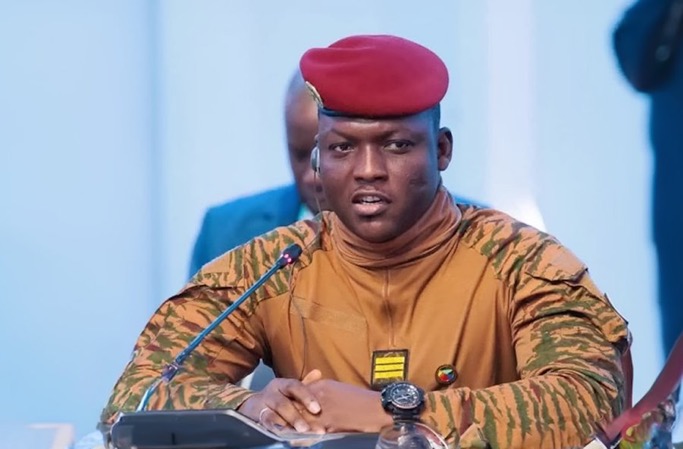
The challenge will be translating Burkina Faso’s rich mineral resources and promising economy into stability and development.
At 36, Burkina Faso’s Ibrahim Traoré is the world’s youngest president, in stark contrast to Africa’s average leader age of 63. He took office in September 2022 after overthrowing Paul-Henri Damiba, who had ousted former president Roch Kaboré earlier that year.
The foundations of the country’s coup administration have been rocky. Last week, the military government survived another apparent coup attempt; one among several since Mr Traoré, an army captain, came to power.
In his inaugural statement, Mr Traoré said Burkina Faso faced an emergency, citing crises in security, defence, healthcare, social action and infrastructure. He pledged to combat terrorism and adhere to the transition timetable agreed with the Economic Community of West African States (ECOWAS), which aimed to restore democratic rule by 1 July 2024.
However, Burkina Faso has since withdrawn from ECOWAS, forming instead the Alliance of Sahel States with Mali and Niger – countries also run by post-coup administrations. Under Burkina Faso’s new transition plan, Mr Traoré may remain in his position until at least 2029.
His popularity has soared since his ascension to power. At President John Mahama’s inauguration in Ghana on 7 January, Mr Traoré received the loudest applause of all 21 African heads of state. This showed not only his popularity but the trend of tolerance for military rule in Africa, especially among the youth.
Afrobarometer reports that almost two-thirds of Burkinabé believe the army should intervene when leaders abuse their power. Likewise, 66 per cent accept military rule, up from 24 per cent in 2012. The fact that the survey was conducted at a time when the country was under military rule portrays a general acceptance of the regime.
However, Mr Traoré’s popularity goes beyond acceptance of military rule. He has embarked on radical reforms that resonate with many Burkinabé. These include reversing his predecessor’s salary increase for government officials while he remainson his military captain earnings.
As part of efforts to take ownership of mineral resources, Mr Traoré has nationalised two gold mines and stopped exporting unrefined gold to Europe, instead inaugurating a national gold refinery expected to process 150 tonnes annually.
Other significant achievements include establishing the National Support Center for Artisanal Cotton Processing, building a new airport, and considerable agricultural investment.
While these are noble attempts to industrialise Burkina Faso, the country must not fall into the usual traps of inefficiencies, corruption and mismanagement that characterise most African state-owned enterprises.
Further, Mr Traoré has rejected financial assistance from the International Monetary Fund and World Bank, insisting the country can develop without the West’s loans and conditionalities. For some, this is a demonstration of Africans handling their own affairs. For the youth, Mr Traoré’s regime is a chance to show what young people can achieve. But for most ordinary Burkinabé, the priority is simply improving their daily living conditions.
At a time of increasing global uncertainty and a decline in international aid, Africa must strive for self-reliance and control of its resources. Like many African countries, Burkina Faso is blessed with natural resources that, if properly managed, could transform citizens’ lives.
The country has mineral resources and produces substantial quantities of gold, zinc, copper, manganese, phosphate and limestone. It also has reserves of diamonds, bauxite, nickel and vanadium, most of which remain largely unexploited.
The country has made gains. Gross Domestic Product (GDP) (in market exchange rate) increased from $3.2 billion in 1990 to $18.3 billion in 2023, and extreme poverty declined from 83 per cent to 27.7 per cent in the same period. But significant challenges remain.
According to the 2023/2024 Human Development Report, Burkina Faso is classified as having low human development and is ranked 185th out of 193 countries on the Human Development Index. Itplaced 149th out of 167 countries on the 2024 Sustainable Development Goals Index, and on the Multidimensional Poverty Index, 64.5 per cent of the population is multidimensionally poor.
However, the economy holds significant promise. Recent research by the Institute for Security Studies’ African Futures and Innovation team shows that Burkina Faso’s economy could grow at an average rate of 8 per cent from 2025 to 2043.
This would translate into an additional GDP per capita of $1,120 above a business-as-usual forecast – and reduce income poverty to only 2.6 per cent of the population. This means an extra 2.4 million Burkinabés could be lifted out of poverty by 2043.
The study identified governance reforms as critical to unlocking the country’s development potential. Indeed, good governance could raise GDP per capita by an extra $240 above a business-as-usual forecast, lifting 500,000 additional Burkinabé out of extreme poverty.
For this, Mr Traoré must lead the country in overcoming political instability, violent extremism and weak institutions. Institutional and structural reforms are needed to enhance security, accountability, public sector efficiency and governance inclusion.
The immediate priority is addressing terrorism, which resulted in the loss of about 40 per cent of the country’s territory, undermining the state’s authority and ability to deliver public services, as thousands of schools and health facilities are closed in those areas. The UN Refugee Agency estimates that over two million people are internally displaced, and those needing humanitarian assistance increased by 35 per cent between 2022 and 2023.
Next should be building strong institutions and strengthening existing ones to improve public sector efficiency and combat corruption. Local governments must be empowered with the resources and capacity to implement development programmes tailored to communities’ needs.
In the medium term, the country must transition into constitutional rule to ensure the political stability and legitimacy needed to drive economic growth. This would also enhance investor confidence, allowing Burkina Faso to attract the foreign direct investment needed for its development. The African Union, civil society organisations and development partners should support the 60-month transition plan to ensure a smooth transition to democracy.
This is not the first time such a charismatic figure has emerged on Africa’s political scene. Many revolutionary leaders started the same way but later deviated from the course as they clung to power. In Ghana, 32-year-old Jerry Rawlings, nicknamed ‘Junior Jesus’, emerged in late 1979 in a bloody revolution to fight corruption and sanitise the country’s political system. But after 19 years in power, his legacy was mixed.
With a young, strong, charismatic leader, Burkina Faso has a chance to get its governance right and achieve its developmental aspirations. This could be a lasting legacy for Traoré’s regime.
Enoch Randy Aikins, Researcher, African Futures and Innovation, Institute for Security Studies (ISS)
(This article was first published by ISS Today, a Premium Times syndication partner. We have their permission to republish).
Politics
PETER OBI WILL WIN 2027 ELECTION EFFORTLESSLY—- Ife Salako(Labour party spokesperson Lagos state)
Published
2 hours agoon
April 24, 2025By
Ekwutos Blog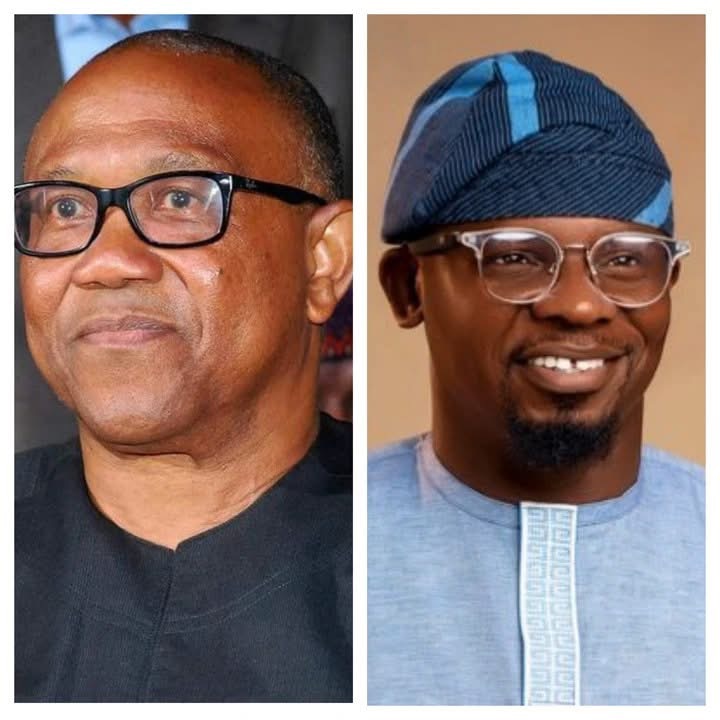
the labour party spokesperson, Lagos state chapter, Mr Ife Salako has affirmed that Peter Obi may not need the help of any governor to win the 2027 general election. Speaking about the recent decamp of some PDP politicians to APC, include that of the incumbent and former Governor of Delta state, the labour party spokesman is of the opinion that these defections have no negative effects on Peter Obi and his chances of becoming the next President of Nigeria.
In his tweet on X, he noted that:
“Okowa and all PDP Governors can defect to APC for all I care,” he wrote. “Let me just remind you all that Peter Obi had not one Governor with him in 2023 and he secured 6 million votes out of all the votes he got.”
“Now, he has 6 million soldiers to defend his votes. PETER OBI WILL WIN 2027 ELECTION EFFORTLESSLY!”

NAF airlifts Airforce students to their destinations across Nigeria

APC CANDIDATES FOR 2025 NIGER STATE LOCAL GOVERNMENT COUNCIL ELECTION

Kyari brought structure, stability to NNPCL – NDYC
Trending

 Trending6 months ago
Trending6 months agoNYA demands release of ‘abducted’ Imo chairman, preaches good governance
- Business6 months ago
US court acquits Air Peace boss, slams Mayfield $4000 fine

 Politics6 months ago
Politics6 months agoMexico’s new president causes concern just weeks before the US elections
- Entertainment6 months ago
Bobrisky transferred from Immigration to FCID, spends night behind bars
- Entertainment6 months ago
Bobrisky falls ill in police custody, rushed to hospital

 Politics6 months ago
Politics6 months agoRussia bans imports of agro-products from Kazakhstan after refusal to join BRICS

 Politics6 months ago
Politics6 months agoPutin invites 20 world leaders
- Politics1 year ago
Nigerian Senate passes Bill seeking the establishment of the South East Development Commission.

